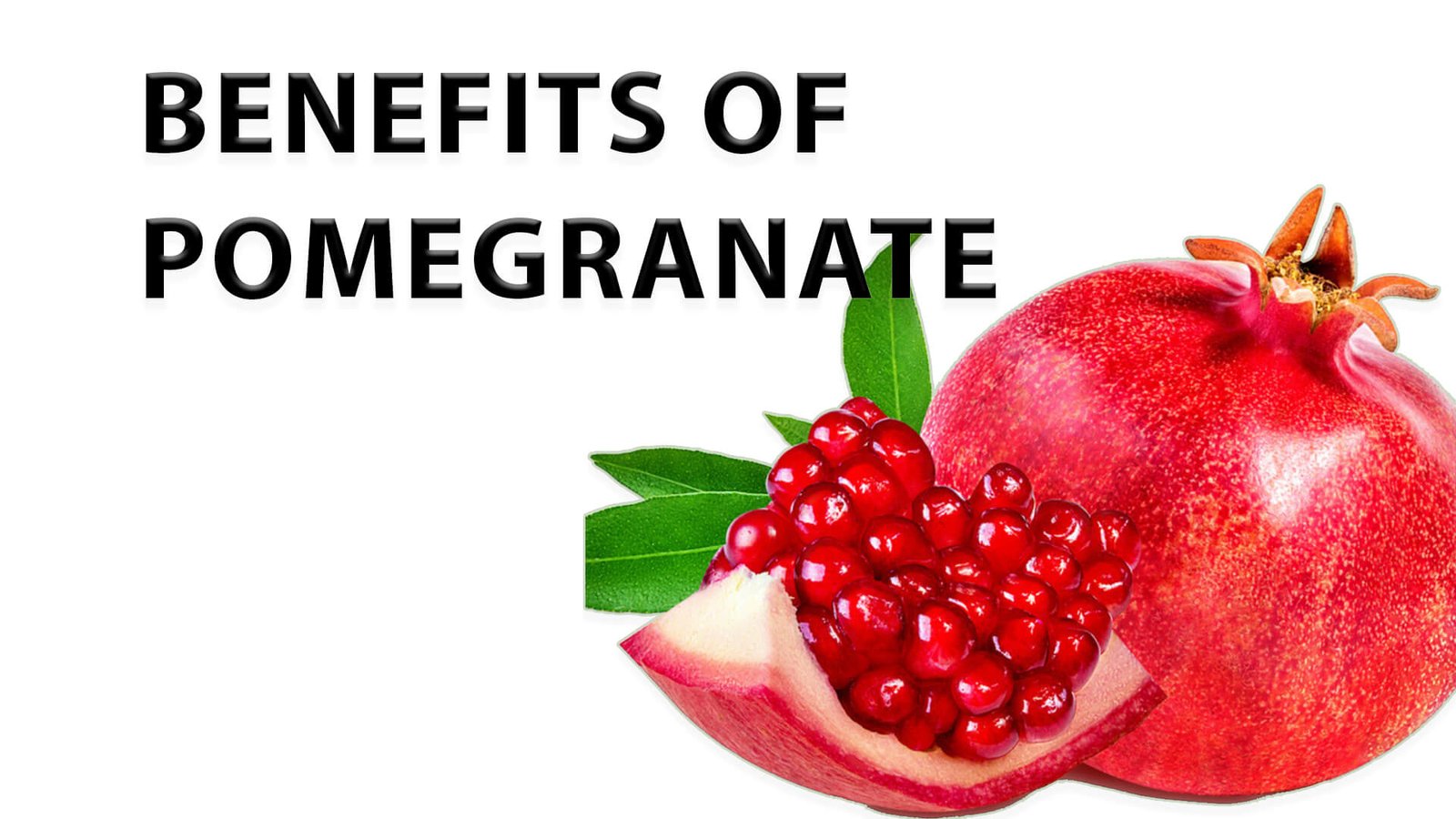Pomegranate (Punica granatum), with its hundreds of ruby-red edible seeds called arils, is a delicious super food. Pomegranate is rich in antioxidant and anti-inflammatory substances.
-
Nutritional Value
Pomegranates offer a wealth of nutrients – Vitamins C, K, B5, B6, folate, fiber, protein and several important minerals such as calcium, copper, potassium, iron, zinc and manganese. The fruit contains very low levels of sodium, cholesterol and saturated fat. But where this splendid fruit truly shines is in its unique content of plant compounds, most notablly Punicalagins and Punicalins which have powerful anti-oxidant properties.
2. Rich in powerful anti-oxidants and reduces chronic inflammation
Our bodies are continuously undergoing complex biochemical reactions to produce energy and to regulate important biological processes that keep us alive and healthy. Ironically, these reactions lead to the formation of free radicals or reactive oxygen species as by-products. These free radicals, also produced by external factors such as smoking, pollution and exposure to UV rays, can cause serious cellular damage to tissues and organs leading to chronic inflammation in the body. Chronic inflammation is the root cause of many serious illnesses including cancer, type 2 diabetes, cardiovascular disease and Alzheimer’s.
Pomegranate contains high amounts of polyphenols including tannins, anthocyanins, ellagic acid and punicalagins. These compounds show extraordinary anti-oxidant and anti-inflammatory properties and reinforce the body’s ability to fight and neutralize excess free radicals thus preventing oxidative stress, reducing tissue and organ damage and lowering chronic inflammation in the body. Did you know the anti-oxidant activity of pomegranate outperforms the antioxidant activity found in red wine, green tea, grape juice, blueberry juice and cranberry juice?
3. Reduces risk of cardiovascular diseases
Cardiovascular problems are complicated and most often they are driven by several factors such as high blood pressure, high cholesterol levels, atherosclerosis etc. Let’s take a look at how pomegranate may play a crucial role in lowering some of these risk factors that may lead to the onset of heart disease.
- Lowers blood pressure: Did you know high blood pressure is one of the most dominant risk factors for developing heart attacks and strokes? A study found that consuming pomegranate juice can control high blood pressure or hypertension. The polyphenolic compounds in pomegranate prevent the activity of ACE or angiotensin converting enzyme. These enzymes convert protein angiotensin I into angiotensin II, a hormone that circulates in the body and constricts blood vessels. By blocking the production of angiotensin II, pomegranate helps to prevent the constriction of blood vessels and lowers blood pressure.
- Reduces cholesterol: Punicic acid, one of the main compounds found in pomegranate seed oil, helps to lower cholesterol and triglycerides levels.
- Prevents and reverses atherosclerosis: Another key process leading to heart disease is atherosclerosis; stiffening or hardening of the arteries, this occurs when there is a build-up of LDL cholesterol deposited into artery walls leading to the formation of arterial plaques. Atherosclerosis is a slow inflammatory process which involves the oxidation, retention and aggregation of cholesterol molecules along the walls of arteries. Pomegranates, loaded with anti-oxidant polyphenols, help to prevent LDL oxidation and protect the heart from developing coronary artery disease.
4. Anti-cancer properties
Pomegranate fruit is a rich source of ellagitannins and other polyphenolic anti-oxidant compounds that have gained a great deal of attention due to their anti-cancer mechanism in the body. Studies suggest that these beneficial compounds have remarkably high anti-inflammatory properties and not only help to inhibit the growth of cancer cells but also increase programmed cell death (apoptosis) in cancerous cells– thus providing protection against many types of cancers such as breast cancer, prostate cancer, lung cancer] and colon cancer.
5. Fights bacterial and fungal infections
Plant compounds found in pomegranate help fight many harmful microorganisms and keep infections at bay. The anti-bacterial and anti-fungal properties of pomegranate help to:
- Provide protection against the yeast Candida albicans,
- Control oral infections that can lead to conditions such as gingivitis, periodontitis and denture stomatitis.
- Protect against many dental plaque microorganisms.
6. Reduces risk factors for Alzheimer’s disease
Punicalagin, the polyphenol compound in pomegranate, may help slow the development of Alzheimer’s disease and dementia while also reducing the associated symptoms. Researchers suggest that pomegranate juice has the ability to reduce the accumulation and deposition of amyloid between the brain’s nerve cells. Amyloids are a sticky build-up of toxic protein structures that can cause inflammation in brain neurones, and are the hallmark of Alzheimer’s disease. In Alzheimer’s disease, damage to brain tissue leads to memory failure, change in personality and an inability to carry out daily activities and mental tasks.
7. Reduces complications in kidney disease patients on dialysis
A study shows that pomegranate juice helps to lower the risk of cardiovascular complications and infections related to dialysis in kidney patients. Consuming moderate amounts of pomegranate juice helps to lower cardiovascular risk factors such as blood pressure and lipid profile while also reducing oxidative damage and inflammation. The study also found that kidney patients who drank pomegranate juice are less likely to be hospitalized due to infections.
8. Improves digestive health
Did you know one medium pomegranate can fulfil almost 45% of the daily recommended intake of dietary fibre? Fibre plays a very important role in keeping digestive system healthy and preventing conditions like constipation and haemorrhoids.
9. Improves symptoms in diabetic patients
Pomegranate shows profound benefits for patients with type 2 diabetes and studies suggest that it may be due to the unique antioxidant polyphenols, tannins and anthocyanins. Pomegranate helps to prevent sudden spikes in sugar levels immediately after a meal and the fruit’s heart-healthy properties also contributes to control symptoms in patients suffering from diabetes. According to a study published in Nutrition Research, fresh pomegranate juice decreases insulin resistance and enhances the function of beta cells of pancreas – all factors that help in the management of type 2 diabetes.
10. Improves memory and brain functions
According to latest research, pomegranate supplements can prevent the memory loss that is often experienced after coronary artery bypass or heart valve surgery . Another study suggests that drinking fresh pomegranate juice daily may help in improving memory and improving brain functions dramatically.
11. Improves immunity
Any surprise on this one? Pomegranate is a rich source of Vitamin C – a powerful anti-oxidant – that helps the body to boost immune function and fight many infectious diseases.
12. Reduces arthritis and improves joint health
- According to a research study, Pomegranate may prove beneficial in reducing joint pain and decreasing inflammation in patients suffering from rheumatoid arthritis.
- The presence of antioxidant compounds in pomegranate helps maintain joint health. How does it work? Pomegranate juice may lessen the inflammation that causes degradation or destruction of cartilage in the joints – a key driving factor that causes pain and stiffness experienced by people suffering from osteoarthritis. One study showed that pomegranate extract can inhibit the production of a specific enzyme that destroys cartilage.
13. Keeps skin young and healthy
Pomegranate is a very rich source of anti-oxidant compounds that reduces free radicals that cause oxidative damage to the underlying lipids and collagen structures in skin. Collagen is a structural protein that makes skin resilient, youthful and elastic. Free radicals can cause excessive damage to collagen, leading to signs of premature aging such as wrinkles, fine lines, pigmentation and dryness. Pomegranate is extensively used in the cosmetic industry thanks to the high Punicic acid content found in Pomegranate seeds. It is an exclusive omega-5 fatty acid that remarkably improves skin tone and elasticity – keeping skin looking young, vibrant while keeping wrinkles at bay.
Interesting Pomegranate Facts
- Pomegranate is considered one of the world’s oldest fruits and is thought to have hailed from the Middle East.
- Did you know pomegranate is actually a berry?
- Pomegranate seeds are called arils.
- Pomegranates are extensively used in Middle Eastern cooking.
- Do you avoid enjoying this superfood as you find it troublesome to remove the edible seeds from the fruit? The easiest way to do that is to first cut off the crown and cut the fruit it into many sections. Place these sections in a bowl of water and gently roll out the seeds using your fingers. Drain the water and enjoy the flavours of jewel-like seeds.
- Once a pomegranate is picked, it will not ripen anymore.
Storage and selection
- Choose fruits that are round, bright and plump. They should be free of cuts, bruises and blemishes.
- Choose fairly large fruits that are nice and shiny. Did you know that larger fruits are likely to promise more juice?
- You can store whole fruits for about a month in a cool, dry place. Refrigerating the whole fruit will keep it fresh for up to two months.
- You can freeze the seeds in an air-tight container or a bag for about a year.
Quick tips to add Pomegranate to your food
- Top your oatmeal, cereals, quinoa or yogurt with pomegranate seeds.
- Add the seeds or fruit juice it into your smoothies. For best health benefits, however, use the seeds as they contain healthy fat and fiber.
- Add seeds to your fruit salad.
- Enjoy leafy green salads with feta cheese and pomegranate
- Blend the seeds in to sauces and purees.
- Sprinkle the ruby-red jewels atop your rice dishes.
References:
- Pomegranates, raw. Nutrition Facts. Self Nutrition data.
- Seeram NP, Aviram M, Zhang Y, et al: Comparison of antioxidant potency of commonly consumed polyphenol-rich beverages in the United States. Journal of Agriculture and Food Chemistry 2008, 56:1415-1422.
- Aviram M, Dornfeld L. Pomeganate juice consumption inhibits serum angiotensin coverting enzyme activity and reduces systolic blood pressure. Atherosclerosis 2001;158(1):195-8.
- Mirmiran P, Fazeli MR, Asghari G, Shafiee A, Azizi F. Effect of pomegranate seed oil on hyperlipidaemic subjects: a double-blind placebo-controlled clinical trial. The British journal of Nutrition. 2010 Aug;104(3):402-6. doi: 10.1017/S0007114510000504. Epub 2010 Mar 25.
- Aviram M, Dornfeld L, Rosenblat M, et al. Pomegranate juice consumption reduces oxidative stress, atherogenic modifications to LDL, and platelet aggregation:studies in humans and in atherosclerotic apolipoprotein E-deficient mice. The American journal of clinical nutrition. 2000;71(5):1062-76.
- Adams LS, Zhang Y, Seeram NP, et al: Pomegranate ellagitannin-derived compounds exhibit antiproliferative and antiaromatase activity in breast cancer cells in vitro. Cancer prevention research (Philadelphia, Pa). 2010 Jan;3(1):108-13. doi: 10.1158/1940-6207.CAPR-08-0225.
- Gasmi J, Sanderson JT. Growth inhibitory, antiandrogenic, and pro-apoptotic effects of punicic acid in LNCaP human prostate cancer cells. Journal of aricultural and food chemistry. 2010 Dec 8;58(23):12149-56. doi: 10.1021/jf103306k. Epub 2010 Nov 10.
- Khan N, Hadi N, Afaq F, Syed DN, Kweon MH, Mukhtar H. Pomegranate fruit extract inhibits prosurvival pathways in human A549 lung carcinoma cells and tumor growth in athymic nude mice. Carcinogenesis. Jan;28(1):163-73. Epub 2006 Aug 18.
- Adams LS, Seeram NP, Aggarwal BB, Takada Y, Sand D, Heber D. Pomegranate juice, total pomegranate ellagitannins, and punicalagin suppress inflammatory cell signaling in colon cancer cells. Journal of agricultural and food chemistry. 2006 Feb 8; 54(3):980-5.
- Pai MB, Prashant GM, Murlikrishna KS, Shivakumar KM, Chandu GN. Antifungal efficacy of Punica granatum, Acacia nilotica, Cuminum cyminum and Foeniculum vulgare on Candida albicans: an in vitro study. Indian journal of Dental Research : official publication of Indian Society on Dental Research. 2010 Jul-Sep;21(3):334-6. doi: 10.4103/0970-9290.70792.
- Sh. Abdollahzadeh, RY. Mashouf, H. Mortazavi, MH. Moghaddam, N. Roozbahani, and M. Vahedi. Antibacterial and Antifungal Activities of Punica Granatum Peel Extracts Against Oral Pathogens. Journal of Dentistry of Tehran University of Medical Sciences. 2011 Winter; 8(1): 1–6.
- Dr. Sowmya Kote, Dr. Sunder Kote, and Dr. Lakshminarayan Nagesh. Effect of Pomegranate Juice on Dental Plaque Microorganisms (Streptococci and Lactobacilli). Ancient science of life. 2011 Oct-Dec; 31(2): 49–51.
- Hartman RE, Shah A, Fagan AM, Schwetye KE, Parsadanian M, Schulman RN, Finn MB, Holtzman DM. Pomegranate juice decreases amyloid load and improves behavior in a mouse model of Alzheimer’s disease. Neurobiology of disease. 2006 Dec;24(3):506-15. Epub 2006 Sep 28.
- “Pomegranate juice reduces damage to tissues, inflammation and infections, study suggests.” American Society of Nephrology. ScienceDaily. ScienceDaily, 19 November 2010.
- Banihani S, Swedan S, Alguraan Z. Pomegranate and type 2 diabetes. Nutrition Research (NewYork, NY). 2013 May;33(5):341-8. doi: 10.1016/j.nutres.2013.03.003. Epub 2013 Apr 15.
- S.A. Banihanicorrespondenceemail, S.M. Makahleh, Z. El-Akawi, R.A. Al-Fashtaki, O.F. Khabour, M.Y. Gharibeh, N.A. Saadah, F.H. Al-Hashimi, N.J. Al-Khasieb. Fresh pomegranate juice ameliorates insulin resistance, enhances β-cell function, and decreases fasting serum glucose in type 2 diabetic patients. Nutrition Research.
- Ropacki SA, Patel SM, Hartman RE. Pomegranate Supplementation Protects against Memory Dysfunction after Heart Surgery: A Pilot Study. Evidence-based complementary and alternative medicine : eCAM. 2013;2013:932401. doi: 10.1155/2013/932401. Epub 2013 Sep 16.
- Bookheimer SY, Renner BA, Ekstrom A, Li Z, Henning SM, Brown JA, Jones M, Moody T, Small GW. Pomegranate juice augments memory and FMRI activity in middle-aged and older adults with mild memory complaints. Evidence-based complementary and alternative medicine : eCAM. 2013;2013:946298. doi: 10.1155/2013/946298. Epub 2013 Jul 22.
- Balbir-Gurman A, Fuhrman B, Braun-Moscovici Y, Markovits D, Aviram M. Consumption of pomegranate decreases serum oxidative stress and reduces disease activity in patients with active rheumatoid arthritis: a pilot study. The Israel medical association journal : IMAJ. 2011 Aug;13(8):474-9.
- Hadipour-Jahromy M, Mozaffari-Kermani R. Chondroprotective effects of pomegranate juice on monoiodoacetate-induced osteoarthritis of the knee joint of mice. Phytotherapy research : PTR. 2010 Feb;24(2):182-5. doi: 10.1002/ptr.2880.





